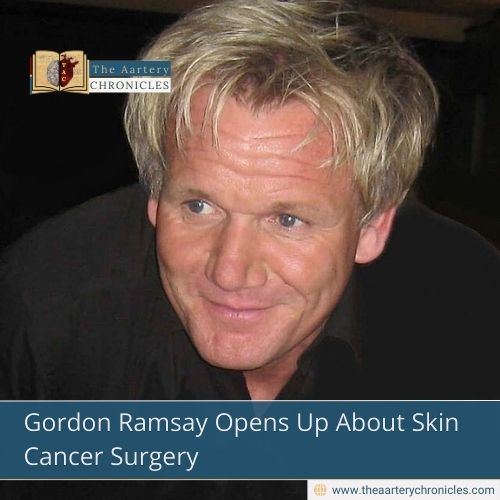

Gordon Ramsay Opens Up About Skin Cancer Surgery
Chef Gordon Ramsay has shared that he recently underwent surgery to treat Basal Cell Carcinoma (a type of skin cancer). The 58-year-old television icon shared recovery photos on Instagram, showing stitches and a bandage beneath his left ear. Ramsay used the moment not only to reassure fans with his trademark humour, saying, “I promise you it’s not a facelift”, but also to highlight the importance of sun protection and regular skin checks.
Who Is Gordon Ramsay?
Known worldwide for shows like Hell’s Kitchen, MasterChef, and Kitchen Nightmares, Gordon Ramsay is more than just a fiery television personality. He is a Michelin-starred chef and restaurateur. At 58, he continues to run restaurants, produce TV programs, and inspire millions with his passion for cooking.
What Happened to Him?
Ramsay revealed through social media that he had surgery to remove a Basal Cell Carcinoma located beneath his ear. Along with his update, he thanked his medical team for their quick care and reminded followers to take sun safety seriously by wearing sunscreen.
What Is Basal Cell Carcinoma?
It is the most commonly diagnosed skin cancer. It occurs in basal cells, which are located in the outermost layer of the skin. Unlike more aggressive cancers, BCC typically grows slowly and rarely spreads to other parts of the body. However, if left untreated, it can invade deeper layers of skin and damage surrounding tissue, particularly in sensitive areas like the face, ears, or neck.
Early Warning Signs
Basal Cell Carcinoma can be tricky to spot at first because it may resemble harmless skin changes. Some early signs include:
- A shiny or wax-like bump, sometimes with visible blood vessels
- A reddish or scar-like patch that does not heal
- Open sores that bleed, crust over, and return repeatedly
- A pink or raised growth with a central dip or rolled edges
- Lesions that itch, hurt, or grow slowly over time
Risk Factors
- Long-term sun exposure or use of tanning beds (most BCC cases are linked to UV damage)
- Fair skin, light hair, and light eyes, which are more sensitive to UV rays
- Being over 50 years old, though younger cases are rising due to higher sun exposure
- Previous history of skin cancer
- Weakened immune system or past exposure to radiation/arsenic
How Is It Diagnosed and Treated?
Diagnosis usually begins with a physical skin exam followed by a biopsy. In rare advanced cases, imaging may be used to assess deeper spread.
Treatment options include:
- Surgery: Standard excision or Mohs micrographic surgery, especially effective for facial lesions
- Electrodessication and Curettage (EDC): Scraping the growth and sealing the area with heat
- Cryosurgery: Freezing the tumour to destroy abnormal cells
- Topical Medications: Such as imiquimod cream for superficial BCC
- Photodynamic Therapy (PDT): Drugs activated by light that kill cancer cells.
- Targeted Therapy or Chemotherapy: Rarely needed, used only in advanced cases
Conclusion
The outlook for Basal Cell Carcinoma is highly favourable when caught early. Most cases can be cured with timely treatment, but recurrence is possible. Therefore, regular skin checks, diligent use of sunscreen, and protective clothing remain essential steps in prevention.
Gordon Ramsay’s experience teaches us that we should never underestimate the importance of sun safety. Spotting changes early and consulting a dermatologist can make all the difference
Source: Inputs from various media Sources
I’m a pharmacist with a strong background in health sciences. I hold a BSc from Delhi University and a pharmacy degree from PDM University. I write articles and daily health news while interviewing doctors to bring you the latest insights. In my free time, you’ll find me at the gym or lost in a sci-fi novel.
- Priya Bairagi
- Health News and Updates,People Forum
- 2 September 2025
- 09:00








